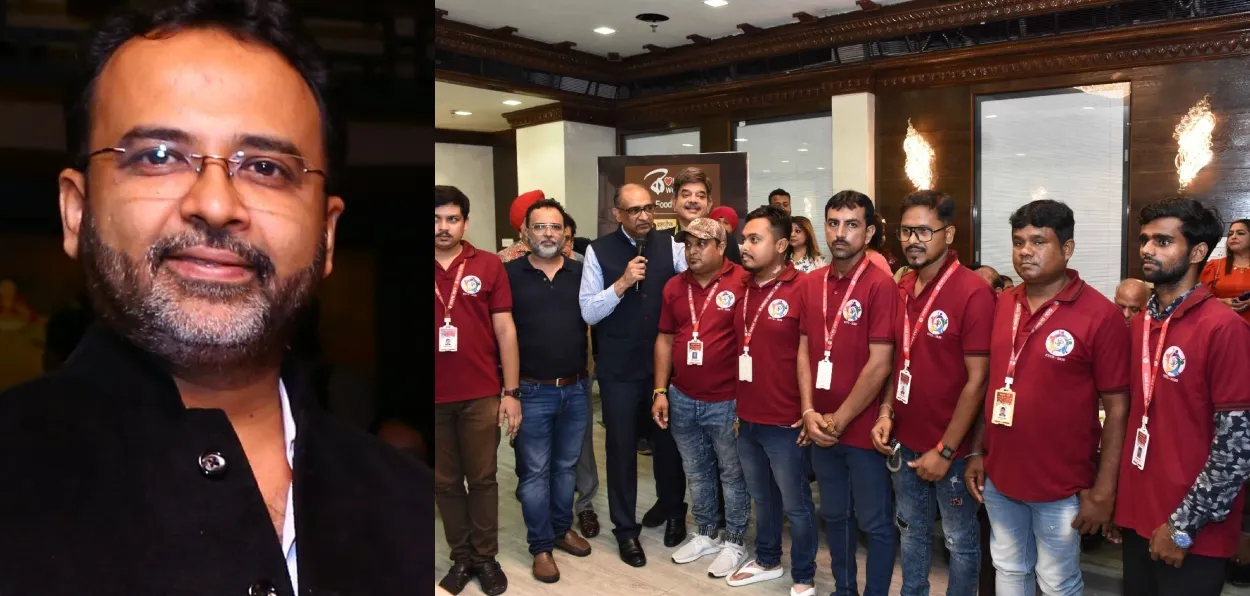
Hena Ahmed/Kolkata
A 320-litre refrigerator laden with food – the leftovers from the restaurant and at homes of citizens – placed at a busy crossing of Kolkata is ensuring that the poor and needy do not go hungry in the City of Joy.
Thanks to the initiative launched by Asif Ahmed, co-owner of Sanjha Chulha restaurant, whose concern for food wastage and food insecurity many around him had led to his initiative on the first Food ATM of the city. The initiative has recently expanded with more civil society groups including the Kolkata We Care group NGO led by Imran Zaki.
"It broke my heart to see good, edible food being discarded at the end of the day, knowing it could nourish someone in need. As a restaurateur, I was often faced with the dilemma of what to do with the surplus food. The idea of redistributing it to the hungry was not just a solution - it was a responsibility," Asif Ahmed said.
Asif Ahmed’s idea emerged from his concern for thousands around him facing food insecurity. He placed a big refrigerator with a transparent door at the roadside with neatly packed food donated by those visiting the restaurant, the restaurant itself, and the citizens inside. People can pick up the food. The volunteers even distribute food by visiting various vulnerable communities in the city.
The feeding the needy programme has since been relaunched through collaboration among Asif Ahmed's outlet, the Kolkata We Care group, the Rotary, Round Table, and JITO (The Jain International Trade Organisation).
The initiative feeds almost 50 people daily and Asif plans to involve the Kolkata Police in it.
“The initiative has since become a beacon of hope and plans are underway to involve Kolkata Police to further strengthen its reach and impact in the community,” he said.
The Food ATM is crafted with care to meet safety standards while overcoming the logistical challenges of food distribution. Like cash in an ATM, food is now available to anyone who needs it, stored in a transparent refrigerator placed in a public space.
Asif Ahmed said, "We wanted to ensure that those who come to the Food ATM feel a sense of dignity. No one should feel ashamed for needing help; everyone deserves respect and compassion."
The We Care group comprises people from various backgrounds who took charge and came together for the movement. Pilot projects also started in schools like Birla Bharti School in Taratala and BDM High School in Narendrapur which aims to raise awareness through students.
The movement has bloomed well in local organisations and volunteers joined hands in educating donors to inculcate a culture of giving. It has set up one Food ATM at the busy Park street and is planning more.
Sana Ahmed, who works in an NGO, said, "We teachers can instill the right values in children by making them more cautious of food, its usage and recycling. Students' involvement will deeply impact their growth during formative years and raise a generation when they quickly absorb and value food and the act of giving.
Asif Ahmed says, "The system could be easily replicated and the viability and success inspired further expansion in multiple locations in Kolkata. Although it started at CIT Road but I felt its impact was restricted to that area only. It was later centralized and expanded to serve a broader range of people within a feasible 5 to 10 km radius. We have plans to come up with one in Park Street and the location of another is not decided yet."
The first Food ATM operates during restaurant hours, from 12 noon till 11:30 PM, with volunteers distributing food in slum areas close by as it is easier to manage.
Asif Ahmed shared a touching story of a lowly paid security guard who struggled with a wage of Rs. 10000- 12,000. He would get his meal from the ATM and it helped him sustain his family and meet ends.
"The Food ATM was a crucial support for him and others like him, making it easier to access meals without compromising their self-respect", added Ahmed.
Another goosebump scene that Asif remembers is that of a small girl, who approached the Food ATM apprehensively and picked up the food packet before vanishing in the thin air.
Imran Khan, a resident of Park Circus Area, said, “It was a poignant experience to see a child, hungry finding comfort in the food provided. The gratitude and relief in these moments highlight the significant impact of the initiative in bridging the gap for those in need."
The initial investment includes purchasing freezer units, building secure structures, and installing security measures. The recurring costs involve electricity, regular maintenance, and staffing. Asif Ahmed says he is open to adopting new means and technologies for the initiative.
